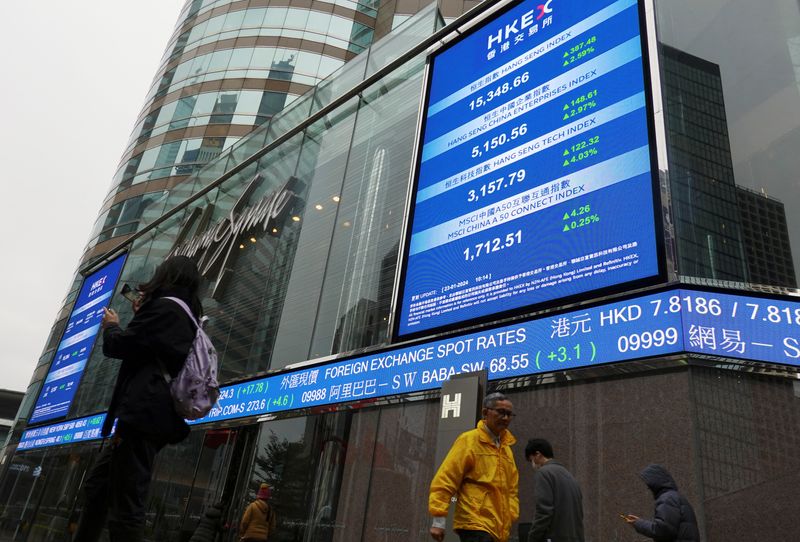SINGAPORE (Reuters) -Small Chinese investors are scrambling even harder than foreigners to exit the country's crumbling stock markets, sending premiums on global index funds skyrocketing as they search for exposure to anything but the sputtering domestic economy.
"The logic is simple: stay away from all yuan assets," said Rain Yang, a retail investor in southern Jiangxi province, who spent last year selling everything but his apartment in order to fund purchases of U.S. stocks, gold and cryptocurrencies.
World stocks went up 20% last year, gold rose 13% and bitcoin 155%. China's blue-chip CSI300 fell 11% and collapsed to a five-year low last week.
Promises of official government support have driven a mild bounce this week. But having heard it all before, long-suffering local investors look to be taking the reprieve as a window for escape - leaving a market which is traditionally largely driven by retail money precariously adrift.
Since China limits investment abroad under a quota scheme introduced in 2006, the qualified domestic institutional investor programme (QDII) and other official channels are jammed, and banned assets such as bitcoin are booming.
There are nearly 400 dollar-denominated wealth management products issued by Chinese banks and their units, according to data from China's banking regulator, and those are in heavy demand. In January alone, more than 131 outbound products have been issued, quadrupling from a year ago, the China Business News reported.
China announced a tripling for individual quotas to access overseas products in Hong Kong and Macau this week, after the wealth connect scheme saw a 12-fold increase in outbound investment last year to 4.9 billion yuan ($682.54 million).
Yuan deposit rates are down, reflecting households continue to hoard of cash given the shaky economic outlook.
In recent days, flows into China-listed funds tracking foreign markets have also surged far beyond their quota-constrained capacity to invest, sending prices on some funds 30% or 40% above asset values, prompting suspensions and warnings from asset managers and stock exchanges.
Investors unable to buy newly-created ETFs from fund managers due to quota restrictions are bidding up the prices in the secondary market.
"The premium reflects frictions in the Chinese outbound investment mechanism, when buying exceeds selling," said Jason Hsu, founder and chief investment officer of Rayliant Global Advisors.
Yet investors such as Lu Deyong in the northeastern Liaoning province are undeterred.
"There is nothing worth buying in the domestic market," he said. "Everything is tumbling."
WHERE ELSE?
Small investors' decisions mirror those of big foreign institutions, which have pulled back from China's markets for months as a much anticipated post-pandemic recovery quickly fizzled and the country's property sector plunged deeper into crisis.
But with retail investors responsible for some 70% of Chinese equity turnover, as per official data, the impact of their desertion is likely to be more lasting.
Roughly a dozen retail investors told Reuters lately they either had opened overseas accounts or were looking to do so, citing reasons such as the tumble in property and stocks, a weakening currency, and increasing policy and geopolitical risks.
Tech-industry employee Simon Lee has been regularly purchasing gold, China's premium national liquor Moutai in bottles and U.S. dollars since last year.
China's economy grew 5.2% for 2023, slightly above the government's target, but the comparison was flattered by a weak, lockdown-hit 2022 and the recovery has been highly uneven. December data published last week showed lacklustre consumption and the fastest fall in home prices for nine years.
"None of these problems have shown any signs of improvement," said Roy Xu, a retail investor in his 20s.
These problems will take five to six years to fix, Xu reckons and hence he doesn't think the market can recover.
Morgan Stanley estimates 70 of 80 global emerging market funds they track are either equal or underweight China and like large investors, smaller ones are chasing uptrends in the U.S. and Japan.
This week, as markets in the U.S. and Japan made milestone highs, the premium on a China-listed exchange-traded fund (ETF) based on the MSCI USA 50 Index exceeded 40% - a record - and another tracking the Nikkei hit 21%.
Premiums also leapt for ETFs that track the S&P 500 Index, the Nasdaq 100 Index and the France CAC40 Index, prompting risk cautions, subscription curbs and trading suspensions from money managers.
To be sure, a bigger-than-expected cut in bank reserve requirements announced by the central bank during the week seems to have put a floor under the selling, at least for now. Chinese stocks closed out their best week in six months.
Then again, six months ago was when the Politburo pledged to step up policy support and since then the CSI300 has lost 11%.
And many analysts say much more stimulus is needed, along with structural reforms, to get the economy and confidence back on track.
For now, Yang in Jiangxi province said he's happy with his hoard of gold coins, bitcoin and half a million yuan in U.S.-tracking ETFs. "If you don't invest in U.S. stocks, gold and cryptocurrency, where else can you put your money?"
($1 = 7.1791 Chinese yuan renminbi)
